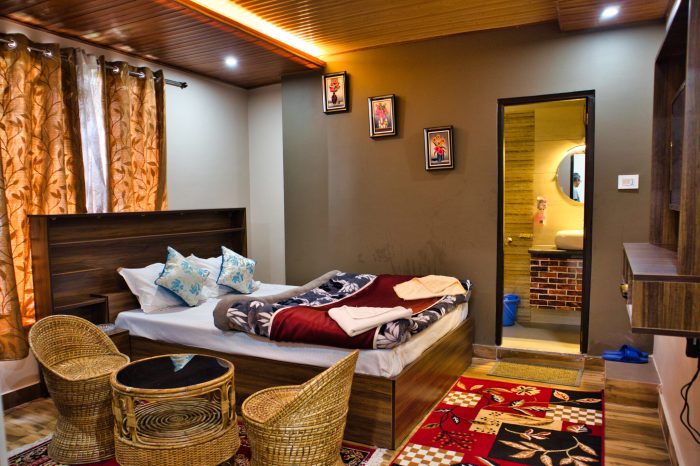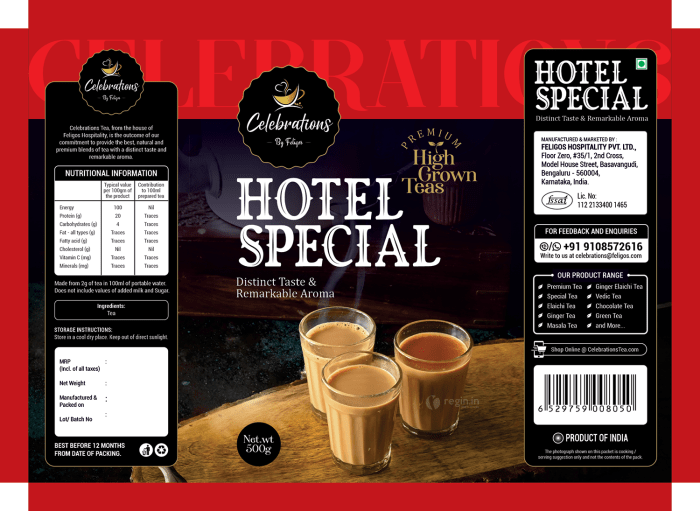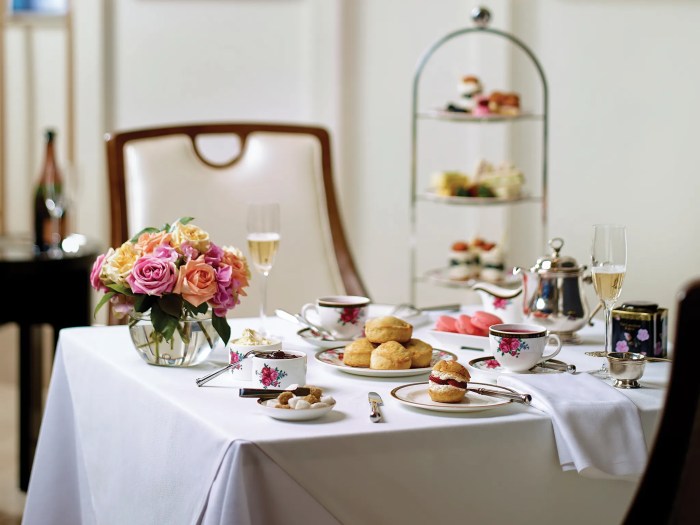Hotels That Offer Traditional Tea Or Coffee Ceremonies
Hotels That Offer Traditional Tea or Coffee Ceremonies welcome you to a world where culture and hospitality intertwine. Here, the simple act of enjoying a beverage transforms into a cherished ritual that connects guests with rich traditions from around the globe. Each sip tells a story, inviting travelers to experience the essence of different cultures through tea and coffee ceremonies.
These rituals, steeped in history and significance, vary widely across regions, yet they share a common goal: to foster connection and mindfulness. From Japan’s meticulous tea ceremonies to Ethiopia’s coffee rites, each experience is unique, filled with specific rituals and symbols that enhance the hotel experience, making guests feel more at home.
Overview of Traditional Tea and Coffee Ceremonies
Traditional tea and coffee ceremonies hold a cherished place in various cultures, serving not only as a means of preparing and consuming beverages but also as a way to foster connection, appreciation, and ritual. These ceremonies encapsulate deep-rooted customs that have evolved over centuries, embodying the values and aesthetics of the societies from which they originate. They offer participants an opportunity to pause, reflect, and share meaningful moments with others.The significance of tea and coffee ceremonies extends beyond the simple act of drinking.
They are often steeped in history, embodying social norms and cultural identity. Common elements include specific rituals that dictate how the drink is prepared, served, and consumed, often accompanied by traditional music, storytelling, or food. Each ceremony is unique, reflecting local ingredients, philosophies, and customs.
Global Examples of Tea and Coffee Ceremonies
Various cultures around the world celebrate tea and coffee through distinct ceremonies, each characterized by its own unique practices. Understanding these can enrich our appreciation for these beloved beverages.
- Japanese Tea Ceremony (Chanoyu): This intricate ritual emphasizes aesthetics, harmony, and respect. The tea master meticulously prepares matcha (powdered green tea) in a serene setting, often accompanied by a traditional sweet to enhance the experience. Participants partake in the ceremony with a sense of mindfulness and tranquility.
- Ethiopian Coffee Ceremony: A communal event that brings people together, this ceremony involves roasting green coffee beans, grinding them, and brewing the coffee in a special pot called a jebena. The process is accompanied by the sharing of stories and often complemented by the offering of snacks like popcorn.
- Chinese Tea Ceremony: This ceremony is a delicate and respectful practice that highlights the art of tea making. It involves multiple steps, including warming the teapot, rinsing the leaves, and serving the tea in small cups. The focus is on appreciating the aroma and taste, enhancing social bonds among participants.
- Turkish Coffee Ritual: Known for its strong flavor and unique preparation method, Turkish coffee is typically served with a glass of water and sometimes a sweet treat like Turkish delight. The preparation involves boiling finely ground coffee with sugar in a special pot called a cezve, creating a rich and aromatic experience.
- Indian Chai Ceremony: In many Indian households, chai is prepared with a blend of spices and milk, often served in small cups. The preparation itself can be a social event, with family and friends gathering to enjoy the warm beverage while engaging in lively conversation.
“Tea and coffee ceremonies are more than just traditions; they are a celebration of life, connection, and culture.”
Hotels Renowned for Offering Traditional Ceremonies
Across the world, certain hotels have gained illustrious reputations for their exquisite tea and coffee ceremonies, immersing guests in rituals rich with culture and history. These ceremonies not only serve as an introduction to local customs but also create unforgettable experiences that guests cherish long after their stay.The unique offerings at each of these hotels elevate the simple act of drinking tea or coffee into an elaborate celebration of tradition and artistry.
Below are hotels that stand out for their exceptional ceremonies and the experiences they provide.
Hotels with Notable Traditional Tea and Coffee Ceremonies
The following hotels are known for their dedication to preserving traditional tea and coffee ceremonies, each providing a distinctive experience that reflects their cultural heritage.
-
The Taj Mahal Palace, Mumbai, India:
This iconic hotel offers a traditional Indian tea ceremony called “Chai,” where guests can savor various types of teas paired with delightful snacks known as “savories.” The ceremony takes place in an elegant setting, showcasing intricate Indian decor, where the warmth of hospitality shines through.“The atmosphere was enchanting, and the chai was the best I’ve ever tasted. It felt like a slice of India right in the heart of Mumbai.” – Sarah, USA
-
The Ritz London, UK:
Renowned for its Afternoon Tea, this hotel invites guests to indulge in an assortment of fine teas accompanied by freshly baked scones, pastries, and finger sandwiches. The ceremony is steeped in tradition, served in a luxurious setting that transports guests to a bygone era.“A quintessential British experience! The service was impeccable, and the tea selection was extraordinary.” – David, Canada
-
Hotel Grand Hyat, Seoul, South Korea:
The hotel offers a traditional Korean tea ceremony that reflects the serenity of Korean culture. Guests can enjoy the delicate flavors of herbal teas while learning about their health benefits, all presented in an intimate and peaceful environment.“Attending the tea ceremony was a highlight of my trip. I learned so much about Korean traditions while enjoying beautiful tea.” – Emily, Australia
-
Raffles Hotel, Singapore:
Famous for its Singapore Sling, Raffles also offers a traditional Peranakan high tea experience. Guests can indulge in a mixture of local delicacies and various teas, all served in the grandeur of colonial architecture, providing insight into the unique Peranakan culture.“The blend of flavors was fascinating, and the setting was just stunning. A truly memorable afternoon.” – Marco, Italy
These hotels not only create luxurious environments but also serve as custodians of their local traditions, inviting guests to partake in meaningful experiences that transcend mere hospitality. Each ceremony is a gateway to understanding the heritage and artistry of tea and coffee culture, enriching the travel experience.
Cultural Impacts of Tea and Coffee Ceremonies in Hospitality

Source: traditionalhotel.in
Traditional tea and coffee ceremonies serve as a bridge between cultures, enriching the hospitality experience for guests around the world. These rituals, steeped in history and significance, not only provide a moment of calm and connection but also allow visitors to immerse themselves in the local culture. As hotels adopt these practices, they enhance their guest experiences, create lasting memories, and foster a sense of belonging.The cultural significance of tea and coffee ceremonies varies across regions, reflecting local customs and traditions.
In places like Japan, the tea ceremony embodies harmony, respect, and tranquility. In contrast, the Ethiopian coffee ceremony emphasizes community and storytelling, inviting guests to participate in a social event that celebrates connection. Each ceremony is a unique expression of cultural identity, allowing guests to appreciate the rich tapestry of traditions that shape the world of hospitality.
Enhancing Guest Experiences Through Traditional Ceremonies
The integration of traditional tea and coffee ceremonies into hotel offerings elevates the guest experience in several meaningful ways. These ceremonies foster connections not only among guests but also between guests and local culture.
- Immersive Cultural Experience: Guests are introduced to local customs, encouraging them to engage with the culture in a deeper way.
- Sense of Community: Participating in a ceremony helps build bonds among guests, creating a shared experience that transcends language barriers.
- Mindful Moments: The slow-paced nature of these ceremonies allows guests to unwind and appreciate the present, enhancing overall well-being.
- Unique Storytelling: Each ceremony comes with its own stories and folklore, providing guests with insights into the region’s history and values.
The educational aspect of these ceremonies is equally vital, as hotels play a significant role in preserving and sharing these traditions with their guests. Through workshops and guided experiences, hotels can illuminate the meaning and techniques behind these rituals.
Educational Aspects of Tea and Coffee Ceremonies
Hotels that offer traditional ceremonies often incorporate educational components that enrich the guest experience. These elements help demystify the rituals, allowing guests to appreciate the subtleties involved.
- Workshops and Demonstrations: Hotels may host sessions where guests can learn the art of brewing tea or coffee, gaining hands-on experience.
- Cultural Narratives: Sharing the history and significance of each ceremony allows guests to understand the cultural context, making the experience more meaningful.
- Tasting Experiences: Guests often have the opportunity to taste various types of tea and coffee, learning about flavor profiles and preparation methods.
- Interactive Participation: By inviting guests to partake in the ceremony, hotels foster a sense of involvement, making the experience more memorable.
These cultural impacts create a rich tapestry of experiences that not only elevate the hospitality sector but also promote a greater understanding and appreciation of diverse traditions among travelers. As guests sip tea or coffee crafted through time-honored methods, they participate in a collective journey that honors the past while celebrating the present.
Designing a Traditional Tea or Coffee Ceremony for Hotels
Creating a memorable experience around traditional tea or coffee ceremonies can elevate the hospitality service of any hotel. These rituals are not just about the beverage; they represent a deep cultural significance that can enhance guest satisfaction and create lasting memories. By thoughtfully implementing these traditions, hotels can offer guests a unique glimpse into local customs while fostering a warm and inviting atmosphere.To successfully design a traditional tea or coffee ceremony, hotels can follow a step-by-step approach that considers cultural authenticity, guest engagement, and staff training.
Each element of the ceremony should reflect the values and significance of the practice, making it a genuine experience for guests.
Step-by-Step Guide for Implementing a Ceremony
The implementation of a traditional tea or coffee ceremony involves several key steps to ensure authenticity and engagement. The following guide Artikels these steps:
- Research Local Traditions: Understand the specific customs and practices related to tea or coffee in the region. This can include the history, preparation methods, and serving styles.
- Select a Venue: Choose an appropriate space within the hotel that reflects the ambiance of the ceremony, such as a tea house or garden setting.
- Gather Essential Ingredients: Secure high-quality tea leaves or coffee beans that are authentic to the ceremony being offered.
- Prepare Ritual Tools: Have the necessary tools and utensils ready, such as teapots, cups, coffee grinders, or traditional serving vessels.
- Design the Ceremony Flow: Artikel the sequence of the ceremony, including preparation, serving, and any storytelling or cultural explanations included.
- Promote the Ceremony: Market the ceremony to guests through brochures, social media, or during check-in, highlighting its cultural significance.
- Train Staff: Ensure staff are well-versed in the cultural aspects and procedures of the ceremony to deliver an authentic experience.
Essential Items for Hosting the Ceremony
Having the right items on hand is crucial for an authentic tea or coffee ceremony. Below is a list of essential items that hotels should consider acquiring:
“The right tools enhance the authenticity and enjoyment of the ceremony, creating a memorable guest experience.”
- High-quality tea leaves or coffee beans specific to the tradition.
- Traditional teapots or coffee brewing equipment.
- Beautifully crafted cups and saucers to serve the beverages.
- Tea towels or coffee filters that reflect the cultural aesthetics.
- Decorative elements such as incense or traditional textiles to set the atmosphere.
- Informational materials that explain the significance of the ceremony to guests.
Training Staff for Authentic Ceremonies
Training staff effectively is essential to ensure the ceremony is conducted with respect and authenticity. The following tips can aid in this process:
“Investing in staff training is investing in the guest experience; empowered staff can share the cultural richness of the ceremony.”
- Cultural Education: Offer workshops on the history and significance of the tea or coffee traditions being showcased.
- Hands-On Practice: Conduct practical sessions where staff can practice the preparation and serving processes under expert guidance.
- Role-Playing Scenarios: Use simulations to help staff handle various guest interactions during the ceremony, preparing them for real situations.
- Feedback Mechanisms: Establish a system for regular feedback from staff on the ceremony process to improve and refine the experience.
- Guest Interaction Training: Teach staff how to engage guests with storytelling and personal anecdotes related to the ceremonies.
Marketing Traditional Ceremonies to Guests
Promoting traditional tea and coffee ceremonies can significantly enhance a hotel’s appeal, attracting guests who seek unique cultural experiences. These ceremonies not only offer a taste of local customs but also create memorable moments for guests, making them more likely to return or recommend the hotel to others. Effective marketing strategies are essential to highlight these offerings and create buzz among potential visitors.One effective strategy is to use storytelling in marketing materials.
By sharing the history and significance of the ceremonies, hotels can engage potential guests on an emotional level. Highlighting personal anecdotes from past guests who enjoyed the ceremonies can also add an authentic touch to promotional content.
Effective Marketing Materials
Creating compelling marketing materials that showcase traditional tea and coffee ceremonies can greatly influence guests’ decisions. The following points illustrate how to craft these materials effectively:
- Brochures: Design visually appealing brochures that highlight the ceremony’s cultural significance, preparation methods, and the experience guests can expect. Include high-quality images of the ceremony in action, showcasing the intricate details and ambiance.
- Videos: Produce short videos that capture the essence of the ceremonies, featuring interviews with hosts and guests. These videos can be shared on hotels’ websites and social media platforms to reach a wider audience.
- Website Features: Dedicate a section of the hotel’s website to traditional ceremonies, complete with detailed descriptions, visuals, and guest testimonials. This allows potential guests to easily find information and encourages them to book their stay.
- Email Campaigns: Use targeted email marketing to inform past guests and potential customers about upcoming tea and coffee ceremonies. Include enticing visuals and offers to encourage bookings.
Showcasing these materials in a manner that reflects the essence of the ceremonies can create anticipation and excitement among potential guests.
Social Media Approaches
Social media platforms provide an excellent opportunity for hotels to showcase their unique offerings. Engaging with audiences through visually captivating content can spark interest in traditional ceremonies. Here are some strategies to consider:
- Instagram Stories and Reels: Use Instagram’s features to share behind-the-scenes glimpses of the ceremony preparation, interactive polls, or live sessions where viewers can experience the ceremony virtually.
- Facebook Events: Create events for upcoming tea and coffee ceremonies, encouraging followers to RSVP. This can help build community interest and facilitate participation.
- User-Generated Content: Encourage guests to share their experiences through photos and stories on social media, perhaps incentivizing them with discounts for featuring the hotel’s ceremonies on their profiles.
- Hashtags: Develop a unique hashtag for the ceremony that guests can use when sharing their experiences. This not only promotes the event but also builds a sense of community among participants.
By employing these marketing strategies, hotels can not only attract guests but also create a lasting impression that fosters loyalty and enhances their reputation as cultural ambassadors. Each interaction with potential guests serves as an opportunity to convey the beauty and significance of traditional tea and coffee ceremonies, enriching their understanding and appreciation of the experience.
Case Studies of Successful Hotel Ceremonies

Source: behance.net
Integrating traditional tea or coffee ceremonies into hotel offerings has proven to be an enriching experience for both guests and hotel brands. This section explores several case studies highlighting these successful ceremonies, the impact on customer satisfaction, and how they enhance hotel branding.
Case Study: The Ritz-Carlton, Kyoto
The Ritz-Carlton in Kyoto offers a traditional Japanese tea ceremony, creating a serene experience for guests. This ceremony not only showcases the art of tea but also immerses guests in the local culture. The hotel’s commitment to authenticity is reflected in the materials used, including handcrafted tea utensils and locally sourced matcha. Feedback from guests has been overwhelmingly positive, with many expressing that the ceremony felt like stepping into another world.
Comments such as,
“This was one of the most peaceful experiences I’ve ever had,”
and
“I felt a deep connection to Japanese culture,”
highlight the emotional impact of the ceremony. Enhanced guest satisfaction has led to increased brand loyalty, with many guests returning specifically for this unique experience.
Case Study: The Four Seasons, Marrakech
The Four Seasons in Marrakech has made Moroccan coffee ceremonies an integral part of its service. Guests are treated to a traditional preparation of coffee, where the aroma fills the air as the beans are roasted and brewed right in front of them. This hands-on approach not only engages guests but also educates them about Moroccan customs. The hotel saw a significant rise in customer satisfaction ratings following the introduction of the coffee ceremony.
Guests noted that it added a personal touch to their stay. One guest remarked,
“Watching the coffee being prepared while learning about its significance made my stay truly special,”
illustrating how such ceremonies can deepen the guest’s connection to local culture. The hotel’s branding has also benefited from this unique offering, positioning it as a culturally immersive destination.
Case Study: Shangri-La Hotel, Paris
In Paris, the Shangri-La Hotel offers an exquisite afternoon tea ceremony that blends classic French pastries with Asian tea traditions. This unique fusion has attracted a diverse clientele, eager to experience a new take on a traditional ritual. The elegant setting, complete with stunning views of the Eiffel Tower, further enhances the experience and aligns with the hotel’s luxury branding.Guest feedback highlights the distinctiveness of this ceremony.
Many mentioned feeling pampered and treated to something special, with comments such as,
“The attention to detail was exceptional; I felt like royalty,”
showcasing how the ceremony not only satisfied taste buds but also elevated the overall experience. The hotel’s investment in this cultural offering has solidified its reputation as a leader in luxury hospitality.
Future Trends in Hotel Tea and Coffee Ceremonies
As the hospitality industry evolves, so too do the traditions that define it. Traditional tea and coffee ceremonies are not only a means of enjoyment but also a reflection of cultural heritage. With changing guest demographics and preferences, hotels are embracing innovative approaches to these timeless rituals, ensuring they remain relevant and engaging for future generations.Emerging trends indicate a fusion of various cultural practices within tea and coffee ceremonies.
This blending creates an opportunity for hotels to offer distinctive experiences that cater to an increasingly global clientele. By incorporating elements from different traditions, hotels can present a unique take on these ceremonies that resonates with diverse guests.
Fusion Ceremonies Combining Cultural Practices
Fusion ceremonies present an exciting avenue for hotels to explore, as they can combine the essence of different cultural rituals into one cohesive experience. This trend not only showcases diversity but also fosters a sense of collaboration between various traditions. Examples of fusion ceremonies may include:
- Asian and Western Blends: Combining Japanese tea rituals with British afternoon tea creates a visually stunning and flavorful experience, incorporating matcha with scones and pastries.
- Middle Eastern and Central American Influences: Integrating Turkish coffee preparation techniques with Latin American flavors can present an adventurous coffee tasting that highlights unique spices and presentations.
- Indigenous and Contemporary Practices: Merging Native American herbal tea traditions with modern brewing methods can provide guests with a deeper understanding of local cultures while enjoying a health-conscious beverage.
Hotels can also adapt their ceremonies to cater to diverse guest demographics by incorporating flexibility and personalization. Offering options based on dietary preferences, cultural backgrounds, or even local themes enhances guest participation and satisfaction. For example, hotels might consider:
- Creating variations of traditional beverages that accommodate vegan or gluten-free diets.
- Providing customizable experiences where guests choose their preferred tea blends or coffee roasts.
- Incorporating storytelling elements related to the origin of different teas or coffees, enhancing the cultural experience.
By thoughtfully designing these ceremonies, hotels can foster a greater connection between guests and the cultural significance behind tea and coffee rituals. The future of these ceremonies lies in their ability to adapt, innovate, and resonate with the hearts of travelers from all walks of life.
“Embracing cultural fusion in tea and coffee ceremonies not only enriches the guest experience but also promotes cultural appreciation and understanding.”
Last Word

Source: cntraveler.com
In conclusion, Hotels That Offer Traditional Tea or Coffee Ceremonies provide an invaluable opportunity to explore cultural richness while enjoying a comforting drink. These experiences not only elevate guest satisfaction but also promote understanding and appreciation of diverse traditions. As the hospitality industry evolves, the integration of these ceremonies promises to create lasting memories and unique connections for all who partake.
Question & Answer Hub
What are traditional tea or coffee ceremonies?
They are cultural rituals that celebrate the preparation and serving of tea or coffee, highlighting specific customs and practices unique to different cultures.
Where can I experience these ceremonies in hotels?
Many hotels around the world, especially in regions with rich tea or coffee cultures, offer these ceremonies as part of their guest experience.
Do I need to book in advance for a ceremony?
It is advisable to book in advance to ensure your spot, as these ceremonies can be popular and may have limited availability.
Are these ceremonies suitable for all ages?
Yes, most traditional tea and coffee ceremonies are family-friendly and can be enjoyed by guests of all ages.
What should I expect during a tea or coffee ceremony at a hotel?
You can expect a detailed presentation of the beverage preparation, an explanation of the cultural significance, and a chance to participate in enjoying the drink.
Can I learn about the history of these ceremonies at the hotel?
Absolutely! Many hotels offer educational components that delve into the history and cultural importance of the ceremonies.









